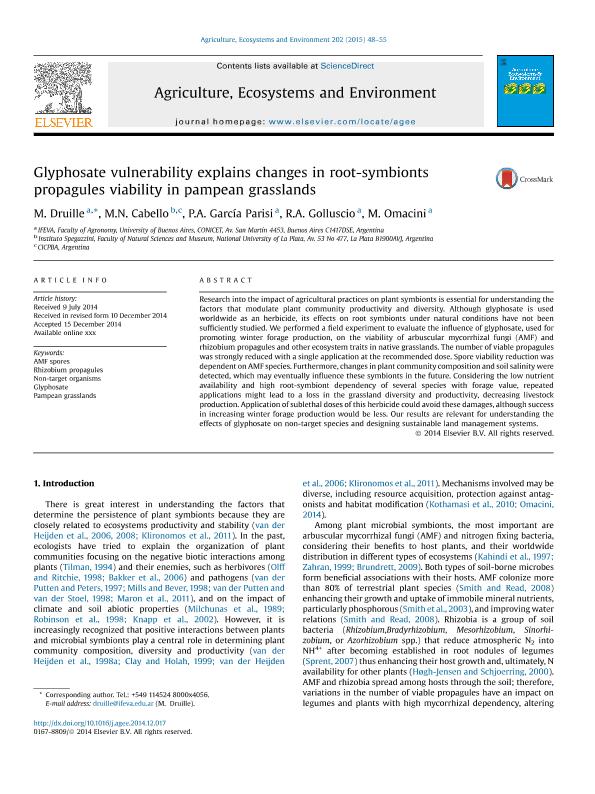Artículo
Glyphosate vulnerability explains changes in root-symbionts propagules viability in pampean grasslands
Druille, Magdalena ; Cabello, Marta Noemi; Garcia Parisi, Pablo Adrian
; Cabello, Marta Noemi; Garcia Parisi, Pablo Adrian ; Golluscio, Rodolfo
; Golluscio, Rodolfo ; Omacini, Marina
; Omacini, Marina
 ; Cabello, Marta Noemi; Garcia Parisi, Pablo Adrian
; Cabello, Marta Noemi; Garcia Parisi, Pablo Adrian ; Golluscio, Rodolfo
; Golluscio, Rodolfo ; Omacini, Marina
; Omacini, Marina
Fecha de publicación:
01/2015
Editorial:
Elsevier
Revista:
Agriculture, Ecosystems and Environment
ISSN:
0167-8809
Idioma:
Inglés
Tipo de recurso:
Artículo publicado
Clasificación temática:
Resumen
Research into the impact of agricultural practices on plant symbionts is essential for understanding the factors that modulate plant community productivity and diversity. Although glyphosate is used worldwide as an herbicide, its effects on root symbionts under natural conditions have not been sufficiently studied. We performed a field experiment to evaluate the influence of glyphosate, used for promoting winter forage production, on the viability of arbuscular mycorrhizal fungi (AMF) and rhizobium propagules and other ecosystem traits in native grasslands. The number of viable propagules was strongly reduced with a single application at the recommended dose. Spore viability reduction was Dependent on AMF species. Furthermore, changes in plant community composition and soil salinity were etected, which may eventually influence these symbionts in the future. Considering the low nutrient availability and high root-symbiont dependency of several species with forage value, repeated applications might lead to a loss in the grassland diversity and productivity, decreasing livestock production. Application of sublethal doses of this herbicide could avoid these damages, although success in increasing winter forage production would be less. Our results are relevant for understanding the effects of glyphosate on non-target species and designing sustainable land management systems
Archivos asociados
Licencia
Identificadores
Colecciones
Articulos(IFEVA)
Articulos de INST.D/INV.FISIOLOGICAS Y ECO.VINCULADAS A L/AGRIC
Articulos de INST.D/INV.FISIOLOGICAS Y ECO.VINCULADAS A L/AGRIC
Citación
Druille, Magdalena; Cabello, Marta Noemi; Garcia Parisi, Pablo Adrian; Golluscio, Rodolfo; Omacini, Marina; Glyphosate vulnerability explains changes in root-symbionts propagules viability in pampean grasslands; Elsevier; Agriculture, Ecosystems and Environment; 202; 1-2015; 48-55
Compartir
Altmétricas



